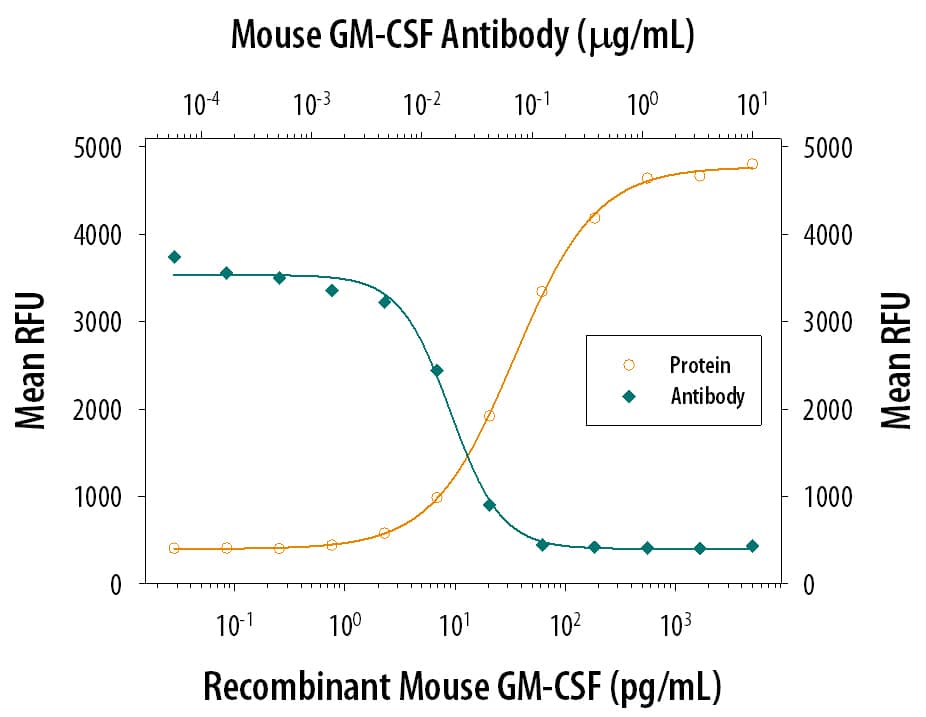Mouse GM-CSF Antibody Summary
Ala18-Lys141
Accession # Q14AD9
Applications
Please Note: Optimal dilutions should be determined by each laboratory for each application. General Protocols are available in the Technical Information section on our website.
Scientific Data
 View Larger
View Larger
Cell Proliferation Induced by GM‑CSF and Neutralization by Mouse GM‑CSF Antibody. Recombinant Mouse GM-CSF (Catalog # 415-ML) stimulates proliferation in the DA3 mouse myeloma cell line in a dose-dependent manner (orange line). Proliferation elicited by Recombinant Mouse GM-CSF (0.1 ng/mL) is neutralized (green line) by increasing concentrations of Goat Anti-Mouse GM-CSF Polyclonal Antibody (Catalog # AB-415-NA). The ND50 is typically 0.01-0.05 µg/mL.
Preparation and Storage
- 12 months from date of receipt, -20 to -70 °C as supplied.
- 1 month, 2 to 8 °C under sterile conditions after reconstitution.
- 6 months, -20 to -70 °C under sterile conditions after reconstitution.
Background: GM-CSF
GM-CSF was initially characterized as a factor that can support the in vitro colony formation of granulocyte-macrophage progenitors. It is also a growth factor for erythroid, megakaryocyte, and eosinophil progenitors. GM-CSF is produced by a number of different cell types (including T cells, B cells, macrophages, mast cells, endothelial cells, fibroblasts, and adipocytes) in response to cytokine or inflammatory stimuli. On mature hematopoietic cells, GM-CSF is a survival factor for and activates the effector functions of granulocytes, monocytes/macrophages, and eosinophils. GM-CSF promotes a Th1 biased immune response, angiogenesis, allergic inflammation, and the development of autoimmunity. It shows clinical effectiveness in ameliorating chemotherapy-induced neutropenia, and GM-CSF transfected tumor cells are utilized as cancer vaccines. The 22 kDa glycosylated GM-CSF, similar to IL-3 and IL-5, is a cytokine with a core of four bundled alpha ‑helices. Mature mouse GM-CSF shares 49-54% amino acid sequence identity with canine, feline, human, and porcine GM-CSF and 69% with rat GM-CSF. GM‑CSF exerts its biological effects through a heterodimeric receptor complex composed of GM-CSF R alpha /CD116 and the signal transducing common beta chain (CD131) which is also a component of the high-affinity receptors for IL-3 and IL-5. In addition, GM-CSF binds a naturally occurring soluble form of GM-CSF R alpha. The activity of GM-CSF is species specific between human and mouse. Mouse GM-CSF is only weakly active on rat cells, although rat GM-CSF is fully active on mouse cells.
Product Datasheets
Citation for Mouse GM-CSF Antibody
R&D Systems personnel manually curate a database that contains references using R&D Systems products. The data collected includes not only links to publications in PubMed, but also provides information about sample types, species, and experimental conditions.
1 Citation: Showing 1 - 1
-
Induction of differentiation in a B lymphoma X B lymphocyte hybrid line. II. Intraclonal heterogeneity in growth, secretion of IgM, and cytokine production in response to lipopolysaccharide.
Authors: Little J, Alling DW, Asofsky R
J. Immunol., 1993-03-15;150(6):2129-38.
Species: Mouse
Sample Types: Whole Cells
Applications: Neutralization
FAQs
No product specific FAQs exist for this product, however you may
View all Antibody FAQsReviews for Mouse GM-CSF Antibody
Average Rating: 5 (Based on 1 Review)
Have you used Mouse GM-CSF Antibody?
Submit a review and receive an Amazon gift card.
$25/€18/£15/$25CAN/¥75 Yuan/¥2500 Yen for a review with an image
$10/€7/£6/$10 CAD/¥70 Yuan/¥1110 Yen for a review without an image
Filter by:



